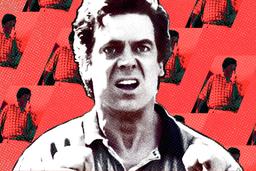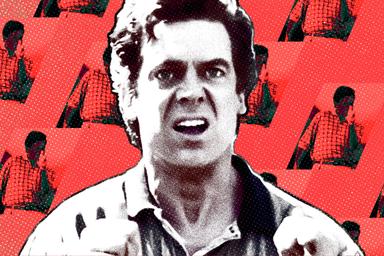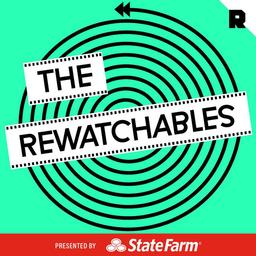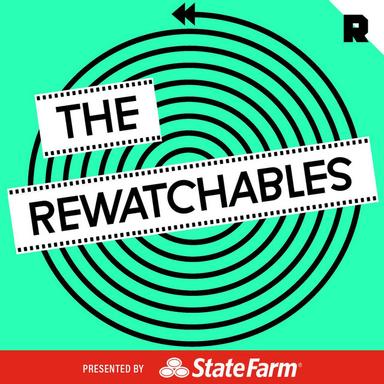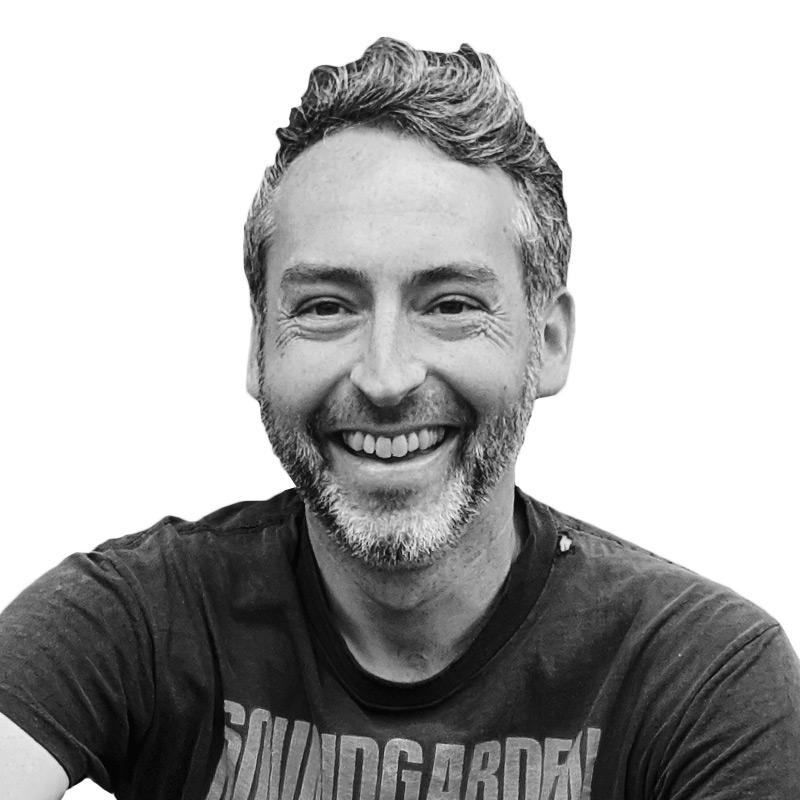Adam Sandler wanted to surprise him. It was a year ago, and Christopher McDonald was visiting the comedian backstage at a show filmed for his latest stand-up special. “I’ve got something for you,” Sandler said, flashing a piece of paper.
It was the first page of the Happy Gilmore 2 script. “I went, ‘Finally,’” McDonald says.
Nobody, not even the most desperately nostalgic elder millennial bro, was more excited for a potential sequel. The original helped turn Sandler into a Hollywood star, and it helped turn McDonald into Shooter McGavin forever. His performance as the handsome, smarmy, finger-gun-firing pro golfer Shooter McGavin was so memorable that almost 30 years later, the character and the character actor are inseparable. Since 1996, going out in public has meant people, usually men, looking his way and shouting, “Shooter!”
Being known as one of the biggest cinematic jerks of the ’90s might understandably cause a person to crack and chase fans away with a Big Bertha. But not McDonald. When someone wants a photo with Shooter, he never clarifies that Shooter isn’t real. He enjoys making a stranger’s day, even if that stranger is asking him whether he eats pieces of shit for breakfast. “It’s so much easier to embrace it rather than just go, ‘Oh, fuck off, man, I’m with my family,’” McDonald says. “You don’t want to be that guy.”
Now in his sixth decade in show business, McDonald has appeared in blockbusters, Academy Award and Emmy Award winners, and cult classics, but no role has stuck to him like Shooter McGavin. And that’s fine with him. After all, his uncanny ability to play a certain type of prick has kept him working longer than most leading men of his age. “He knows how important that character is,” says Kyle Newacheck, the director of Happy Gilmore 2. “Why would he run from that?”
Christopher McDonald’s transformation into Shooter McGavin started in 1995 in Vancouver, where he was filming the sci-fi thriller Unforgettable with Ray Liotta and Linda Fiorentino. At the time, director Dennis Dugan was looking for someone to play the villain in Happy Gilmore. The comedy, coincidentally, was scheduled to be shot in British Columbia that summer. While in preproduction on the movie, Dugan found McDonald in the lobby of his hotel and gave him the script. “You’ve got to read this,” said Dugan, who told him he’d be the perfect guy to go toe-to-toe with Adam Sandler.
The screenplay made McDonald laugh a lot, but initially, he didn’t commit to the part. He missed his family. But before heading home, he made a quick stop in Washington to partner with Seattle SuperSonics All-Star Detlef Schrempf in a celebrity golf tournament. “We won,” says McDonald, who was a jock at his high school in Romulus, New York.
The taste of victory made McDonald reconsider. “I wonder if that movie’s still available,” he remembers thinking to himself. Then he got in touch with Dugan. “I said, ‘I want to sit down with Adam,’” McDonald recalls. “We sat down in a little coffee shop and laughed for fricking 25 minutes, and I said, ‘I’ve got to do this movie.’”
Like Steve Buscemi and John Turturro, McDonald was the kind of serious actor who had a knack for fitting into Sandler’s silly world. “Adam is great at mixing non-comedic talent into a comedy movie and using their skills as strengths for the comedy,” Newacheck says. “Which is something that I believe can be said about Chris. He’s just about as trained of a thespian as you can be.”
Before signing on to make Happy Gilmore, McDonald had only one request for Dugan: “I have to bring my family here. I don’t want to be a bad dad. And he said, ‘Let me work on that.’” Dugan then talked to producer Robert Simonds, who took care of McDonald. “They got me a house, and I lived with my kids on the water and it was beautiful,” he says. “I came in every day, and boy, we had at it. We had nothing but fun. It’s just a joy to actually get paid to play golf every day.”
On set, McDonald and Sandler avoided each other—like real rival golfers would. “It was good for the character chemistry,” McDonald says. From the very beginning, they made sure the audience would know how much their characters hated each other. In the first scene they shot together, Shooter McGavin threatens to burn Happy Gilmore’s grandmother’s house down and “piss on the ashes.”
They filmed their most famous exchange a bit later:
Shooter: You’re in big trouble, though, pal. I eat pieces of shit like you for breakfast!
Happy: You eat pieces of shit for breakfast?
After Happy’s burn, Shooter, looking as flustered as a human being can be, bumbles and blurts out, “No!” That wasn’t in the script. “But the fact that they left it in was a joy,” McDonald says.
Smarm seems to come easy to McDonald. “I’m sure he has somebody that he’s imitating in his life, this nose-up, high-society, collar-popped kind of something,” Newacheck says. “I have to ask him where he’s getting that from because it comes out so naturally. But he’s not that way in real life.”
McDonald says that he actually had a lot of work to do to look like a passable on-screen golfer. PGA Tour pro Mark Lye, a consultant on the movie, helped the actor get his game in shape. McDonald says that he managed to get down to a 7 handicap.
At that point, McDonald was used to picking up new skills in pursuit of movie and TV roles. He taught himself to drive an 18-wheeler and ride a horse. He can roller-skate. Before Terminal Velocity, a 1994 action thriller starring Charlie Sheen as a skydiver, he even took parachuting lessons. (On that set, he and James Gandolfini—who played a pair of Russian mobsters—drank vodka together in their trailers to, well, get into character.) “I’ve learned all this stuff by just being an actor who has to fill this part,” McDonald says.
By the early ’90s, filmmakers had begun to see McDonald’s special blend of smug charisma. In Ridley Scott’s classic Thelma & Louise, he played (real-life ex) Geena Davis’s controlling has-been husband, Darryl. “She had two choices, go back to this husband who’s an asshole, or go over the cliff,” McDonald says. “And she’s going over the cliff.” When the movie came out, fans let him have it. But the guff he got felt validating—that meant he’d done his job well.
“People were like, ‘You were such a jerk!’” McDonald says. “I said, ‘Yeah.’”
McDonald’s willingness to look bad—as a good-looking guy—is a big reason he’s had such a long career. As he proved as slick host Jack Barry in Robert Redford’s Quiz Show and as shady motivational speaker Tappy Tibbons in Darren Aronofsky’s Requiem for a Dream, playing an egomaniac trying to mask his vulnerability can be awfully entertaining. “My most memorable parts have been when I wasn’t afraid to say yes to playing the fall guy, the cad, the alpha-villain,” McDonald once told The New York Times. “After Thelma & Louise, I got offered every hayseed-chewing, pickup-driving, wife-beating rat out there. Until I had to say, ‘Are they serious?’ I can do other things.” But, he admitted in the interview, “You’d rather take those parts than not work. Being anonymous in this business is probably the worst thing in the world.”
Shooter McGavin was the kind of alpha villain whom McDonald embodied easily. “When he gets the attitude of Shooter going and just starts walking around and feeling like the cock of the walk, you are like, ‘Uh-oh, here it comes. Here it comes,’” Newacheck says. “But then it’s not like, ‘Oh, that guy’s cool.’ You’re always like, ‘That guy’s kind of a dork.’”
While playing a guy who tells his rival’s fans to “go back to your shanties” was fun, McDonald didn’t really expect Shooter to endure. But Happy Gilmore did well at the box office, making $41.4 million against a $12 million budget. And then it landed on cable television. “Everybody watched it,” McDonald says. “And that’s when people started going, ‘Oh my God, I mean, you’re in my living room. We watch you every freaking day. We watch that probably four times a week.’ They couldn’t get enough of it. It was absolutely crazy. And so to this day, I still get stuff like that.”
Even though McDonald spent the next several decades playing supporting roles in movies like SLC Punk, The Faculty, The Iron Giant, and The House Bunny and becoming a regular on TV series like Boardwalk Empire and now Hacks, Shooter never vanished in a cloud of finger-gun smoke. Recently, McDonald has started to appear at fan conventions. “Mostly, they’re really, really good people, and you want to make their day,” he says. “So you sign a thing, you pick up a couple of bucks.”
McDonald says that over the years he’s “begged” Sandler to cast him in his movies. His response? “No, you’re always going to be Shooter.” That, McDonald acknowledges, is true. So eventually, he started asking Sandler to bring Happy Gilmore back. “I was like a broken record,” McDonald says. “Every time I’d see him: ‘Hey, we’ve got to do a sequel, man.’”
After McDonald first heard that the Happy Gilmore reboot might happen, he couldn’t contain his excitement. Even though Sandler had told his friend to keep the news under wraps, McDonald mentioned that the movie was in the works in a March 2024 interview with Cleveland sports radio station 92.3 The Fan. Naturally, his slip went viral. Media requests poured in.
Afterward, McDonald was worried that he’d screwed up badly. But in the end, he claims, “I got my wrist slapped,” and that’s it. He says that he apologized directly to Netflix co-CEO Ted Sarandos, who didn’t exactly seem upset. “He said, ‘Are you kidding me? You kicked it off, baby. It’s all good.’” That May, the streamer announced the reboot.
Now that Shooter’s officially back, McDonald says, “I just couldn’t be happier.” Happy Gilmore 2 is basically the character’s attempt at redemption.
Newacheck says that when he spoke to McDonald for the first time, “I was kind of like, ‘Hi, you want me to call you Christopher?’ And he was like, ‘Just call me Chris.’”
But when filming started, Newacheck couldn’t bring himself to call McDonald by his real name. “When he came onto the set, even when he wasn’t performing, I was like, ‘I’m sorry, I’m just going to call you Shooter,’” the director says. “I was like, ‘Is that OK?’ And he’s like, ‘Absolutely.’”
By now, the actor understands that urge. The character is hard to resist. To this day, even Adam Sandler calls him Shooter. “He doesn’t even know my name,” McDonald says with a smile.
